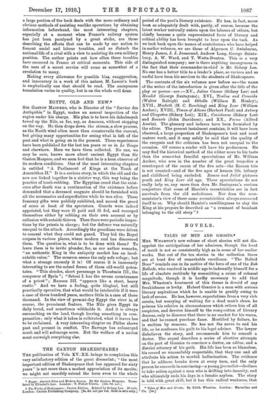EGYPT, OLD AND NEW.*
SLR GASTON MASPEHO, who is Director of the "Service des Antiquites " in Egypt, makes an annual inspection of the region under his charge. His plan is to have his dahabeeyah towed up the Nile, as far, say, as Assouan, without stopping on the way. He then drops down the stream, a slow process, as the North wind often more than countervails the current, but giving many opportunities for seeing what is left of the past and what is going on in the present. These experiences have been published for the last ten years or so in Le Temps and elsewhere. Here we have them collected. No one, we may be sure, knows more about ancient Egypt than Sir Gaston Maspero, and we soon feel that he is a keen observer of its modern conditions. One of the most interesting chapters is entitled "A Parliament of Kings at the Tomb of Amenothes IL" It is a curious story, in which the old and the new are linked together in a sinister way, this way being the practice of tomb-robbing. The Egyptian creed that the exist- ence after death was a continuation of the existence before demanded that a deceased magnate should be furnished with all the necessaries and superfluities while he was alive. These funerary gifts were publicly exhibited, and moved the greed of some at least of the spectators. Guards were indeed appointed, but they were ill paid and ill fed, and recouped themselves either by robbing on their own account or by collusion with outside thieves. Then there were periodic inspec- tions by the priests in charge ; but the defence was naturally unequal to the attack. Accordingly the guardians were driven to conceal what they could not guard. They hid the Royal corpses in various places, where modern zeal has discovered them. The question is, what is to be done with them? To leave them is to invite plunder, for, as our author remarks, "an authentic King in the antiquity market has an incal- culable value." The museum seems the only safe refuge ; but what a strange anomaly it is! Of course it is immensely interesting to see the actual forms of these old-world poten- tates. "This slender, short personage is Thoutmos !IL, the conqueror of Syria "; " Setoui I. has the serene countenance of a priest " ; Ramses III. "appears like a stout, heavy rustic." And we have a feeling, quite illogical, but still practically operative, that what would be intolerable if it were a case of three hundred years, matters little in a case of three thousand. In the view of present-day Egypt the river is, of course, the prominent feature. The Nile gives Egypt its daily bread, and sometimes withholds it. And it is always encroaching on the land, though leaving something in com- pensation; only what it takes is cultivated, what it leaves has to be reclaimed. A very interesting chapter on Philae shows past and present in conflict. The Barrage has submerged much and will submerge more. But the welfare of a nation must outweigh everything else.






















































 Previous page
Previous page